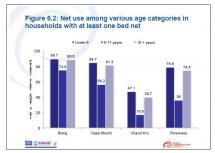Attitudes, Beliefs and Practices Relevant to Malaria Prevention and Treatment in Liberia
A cross-sectional survey was implemented in Liberia in 2014 with the primary aim of identifying attitudes and beliefs that are associated with four outcomes of malaria prevention and treatment:
- Use of bed nets
- Receipt of malaria prophylaxis during antenatal care visits
- Use of health services when a child has an episode of fever
- Acceptance of indoor spraying
This report examines the relationship of socio-demographic variables, ideational factors, exposure to malaria messages and household variables with prevention and treatment behavioral outcomes. Indoor residual spraying was common in targeted areas: 50 percent of sampled households in the five districts reported being covered by PMI were sprayed at the time of the survey. Over a third of households had at least one net (36 percent).
However, in households with nets, most caretakers slept under a net on the night before the survey. Treatment of child with fever was almost universal and about two-thirds of treated children received Artemisinin-based Combination Therapy (ACT) (67 percent). About half of the children who received ACT did so the same or next day of the start of the child’s fever.
The majority of pregnant women (91 percent) reportedly took medicine to prevent malaria; almost all of these women reported that they took at least one dose of sulfadoxine/pyrimethamine (SP). Uptake of at least two doses of Intermittent preventive treatment of malaria (IPTp2+) was widespread with 75 percent of women with children ages two years old or younger reporting that they took two or more doses of the medication during their last pregnancy.
Source: Johns Hopkins University Center for Communication Programs
Date of Publication: March 25, 2019
SIMILIAR RESOURCES
Tools
Examples
- Care of Mosquito Nets Toolkit
- ITN Access Indicator Snapshot
- KAP COVID: Exploring Knowledge, Attitudes, and Practices for COVID-19 Prevention
- ITN Access and Use Report 2018
- ITN Access and Use - Mapping Net Culture in Sub-Saharan Africa
- Understanding ITN Use: What do your Numbers Really Mean? - Webinar and Presentation
- ITN Access and Use Report
- SBCC for Malaria in Pregnancy: Strategy Development Guidance
- Social and Behavior Change for Service Delivery Community of Practice Spearheading Progress Through a Shared Agenda
- HIV Evidence Database
- Stories of People Living with HIV, Zambia
- Programmatic Implications of Zika-Related Knowledge, Attitudes, and Practices
- Using Human-centered Design to Strengthen Guyana’s Malaria Testing and Treatment Adherence Program
- Rhythm of Life Music and Health Festival - Zambia
- Malaria-themed Radio Magazine Program

